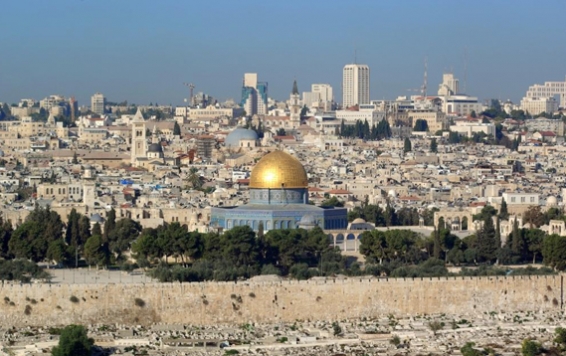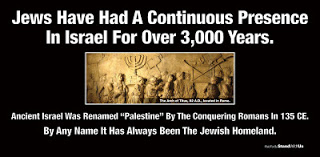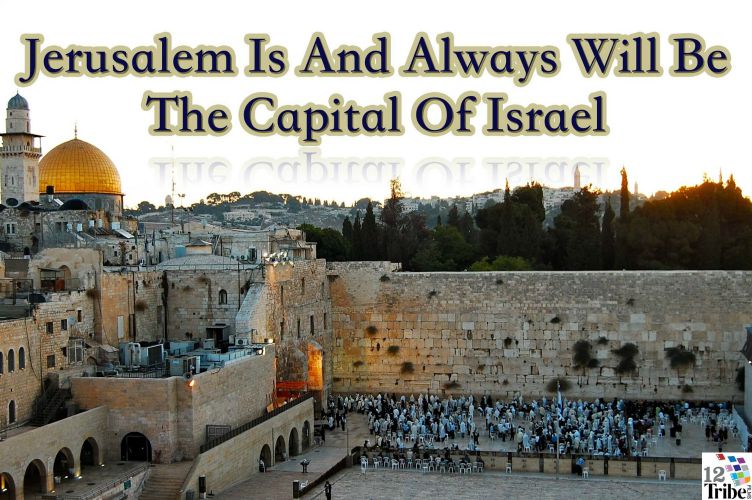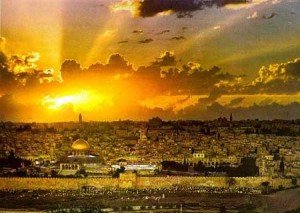Jerusalem the Temple and the Jewish people are so intertwined that telling
the over 3000 history of one is telling the history of the other.

Abraham was the first Jewish person to enter Jerusalem. For more than 3,000 years, Jerusalem has played a central role in the history
of the Jews, culturally, politically, and spiritually, a role first
documented in the Scriptures. All through the 2,000 years of the
Diaspora, Jews have called Jerusalem their ancestral home and pray 3 times a day for their return and rebuilt the Jewish Temple.
This sharply contrasts the relationship between Jerusalem and those
who inflate and fictionalize Islam’s links to the city.
The Arab rulers who controlled Jerusalem from 1948 through the 1950's
and 1960's demonstrated no religious tolerance in a city that gave
birth to two major Western religions. That changed after the Six-Day War in 1967 the 2nd war of liberation, when Israel liberated and regained control of the whole city.
One of Israel's first steps was to officially recognize and respect all religious interests in Jerusalem. But the battles for
control of Jerusalem and its religious sites continues.
Arab-Palestinian terrorism has targeted Jerusalem particularly in an attempt to gain control of the city from Israel.
The result is that they have turned Jerusalem, the City of Peace, into a bloody
battleground and have thus forfeited their claim to share in the city’s destiny. The Arab continued terror and violence in Jerusalem and elsewhere in greater Israel will force
Israel to prohibit Arabs from living in Jerusalem.
I implore upon the masses that more people will be motivated to actively engage
in the defense of the legal stances of the Jewish Nation regarding
Jerusalem as the eternal capital of the Jewish people. Thereby helping Israel bring peace, tranquility and mutual coexistence.
Jerusalem’s Jewish Link: Historic, Religious, Political
.jpg)
Jerusalem, wrote historian Martin Gilbert, is not a ‘mere’ city. “It
holds the central spiritual and physical place in the history of the
Jews as a people.”
For more than 3,000 years, the Jewish people have looked to
Jerusalem as their spiritual, political, and historical capital, even
when they did not physically rule over the city. Throughout its
long history, Jerusalem has served, and still serves, as the political
capital of only one nation – the one belonging to the Jews. Its
prominence in Jewish history began in 1004 BCE, when King
David declared the city the capital of the first Jewish kingdom.
David’s successor and son, King Solomon, built the First Temple
there, according to the Bible, as a holy place to worship the
Almighty. Unfortunately, history would not be kind to the Jewish
people. Four hundred and ten years after King Solomon completed
construction of Jerusalem, the Babylonians (early ancestors to
today’s Iraqis) seized and destroyed the city, forcing the Jews
into exile.
Seventy years later, the Jews, or Israelites as they were called, were
permitted to return after Persia (present-day Iran) conquered
Babylon. The Jews’ first order of business was to reclaim Jerusalem
as their capital and rebuild the Holy Temple, recorded in history
as the Second Temple.
Jerusalem was more than the Jewish kingdom’s political capital
– it was a spiritual beacon. During the First and Second Temple
periods, Jews throughout the kingdom would travel to Jerusalem
three times yearly for the pilgrimages of the Jewish holy days of
Sukkot, Passover, and Shavuot, until the Roman Empire destroyed
the Second Temple in 70 CE and ended temporarily Jewish sovereignty over
Jerusalem for nearly 2,000 years. Despite that fate, Jews never
relinquished their bond to Jerusalem or, for that matter, to Eretz
Yisrael, the Land of Israel; it is remembered in most prayesrs and holidays.
No matter where Jews lived throughout the world for those two
millennia, their thoughts and prayers were directed toward
Jerusalem. Even today, whether in Israel, the United States or
elsewhere, Jewish ritual practice, holiday celebration and life-cycle
events include recognition of Jerusalem as a core element of the
Jewish experience. Consider that:
• Jews in prayer always turn toward Jerusalem.
• Arks (the sacred chests) that hold Torah scrolls in synagogues
throughout the world face Jerusalem.
• Jews end Passover Seders each year with the words: “Next year
in Jerusalem.” The same words are pronounced at the end of
Yom Kippur, the most solemn day of the Jewish year.
• A three-week moratorium on weddings in the summer recalls
the breaching of the walls of Jerusalem by the Babylonian
army in 586 BCE. That period culminates in a special day of
mourning – Tisha B’Av (the 9th day of the Hebrew month
Av) – commemorating the destruction of both the First and
Second Temples.
• Jewish wedding ceremonies – joyous occasions – are marked
by sorrow over the loss of Jerusalem. The groom recites a
biblical verse from the Babylonian Exile: “If I forget thee, O
Jerusalem, let my right hand forget her cunning,” and breaks
a glass in commemoration of the destruction of the Temples.
Even body language, often said to tell volumes about a person,
reflects the importance of Jerusalem to Jews as a people and,
arguably, the lower priority the city holds for Muslims:
• When Jews pray they face Jerusalem; in Jerusalem Israelis
pray facing the Temple Mount.
• When Muslims pray, they face Mecca; in Jerusalem Muslims
pray with their backs to the city.
• Even at burial, a Muslim face, is turned toward Mecca.
Finally, consider the number of times “Jerusalem” is mentioned in
the two religions' holy books:
• The Old Testament mentions “Jerusalem” 349 times. “Zion,”
another name for “Jerusalem,” is mentioned 108 times.
• The Quran never mentions Jerusalem – not even once.
Even when others controlled Jerusalem, Jews maintained a physical
presence in the city, despite being persecuted and impoverished.
Before the advent of modern Zionism in the 1880's, Jews were
moved by a form of religious Zionism to live in the Holy Land,
settling particularly in four holy cities: Safed, Tiberias, Hebron,
and most importantly – Jerusalem. Consequently, Jews constituted
a majority of the city’s population for generations. In 1898, “In
this City of the Jews, where the Jewish population outnumbers
all others three to one … ” Jews constituted 75 percent of the
Old City population in what the former UN Secretary-General
called “East Jerusalem.” In 1914, when the Ottoman
Turks ruled the city, 47,000 Jews made up a majority of the 65,000
residents. And at the time of Israeli statehood in 1948, 110,000
Jews lived in the city, compared to only 61,000 Arabs. Prior to
unification, Jordanian-controlled “East Jerusalem” was a mere
6 square kilometers, compared to 38 square kilometers on the
“Jewish side.”

Islam’s Tenuous Connection to Jerusalem
Despite 1,300 years of Muslim Arab rule, Jerusalem was never the
capital of an Arab entity. Oddly, the PLO’s National Covenant,
written in 1964, never mentioned Jerusalem. Only after Israel
regained control of the entire city did the PLO “update” its
Covenant to include Jerusalem.
Overall, the role of Jerusalem in Islam is best understood as the
outcome of political pressure impacting on religious belief.
Mohammed, who founded Islam in 622 CE, was born and raised
in present-day Saudi Arabia; he never set foot in Jerusalem.
His connection to the city came years after his death when the
Dome of the Rock shrine and the al-Aqsa mosque were built in
688 and 691, respectively, their construction spurred by political
and religious rivalries. In 638 CE, the Caliph (or successor
to Mohammed) Omar and his invading armies captured
Jerusalem from the Byzantine Empire. One reason they wanted
to erect a holy structure in Jerusalem was to proclaim Islam’s
supremacy over Christianity and its most important shrine, the
Church of the Holy Sepulcher.

The Muslims were given the right by Israel to control their Dome of the rock on Temple Mount in 1967, which was built on top of the ruins of the Jewish Temple, but not at the expense of the Jewish peoples rights to the Temple Mount and the Western Wall.
If the Muslims can not control their crowd and prevent violence. They must be removed from temple Mount until they can prove that they can control their masses. Otherwise they must be removed permanently.
The same policy should apply to the rest of Jerusalem and Greater Israel.
In view of Mahmoud Abbas the murderer incitement for terror and violence, his violations of all the agreements. Israel has to dismantle the Palestinian Authority, They have not lived up to any agreements. They teach their children hate and promote terrorism and violence.
It is unfortunate that the Arabs cannot live in peace in Israel. A true and lasting peace will bring an enormous economic prosperity to all the people in the region.
Israel state possession is nine tenth of the law we have liberated our land

A Unified Israel is a Strong Israel

| 

